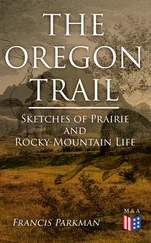Francis Sullivan - The Wilderness Trail
Здесь есть возможность читать онлайн «Francis Sullivan - The Wilderness Trail» — ознакомительный отрывок электронной книги совершенно бесплатно, а после прочтения отрывка купить полную версию. В некоторых случаях можно слушать аудио, скачать через торрент в формате fb2 и присутствует краткое содержание. Жанр: foreign_language, foreign_prose, на английском языке. Описание произведения, (предисловие) а так же отзывы посетителей доступны на портале библиотеки ЛибКат.
- Название:The Wilderness Trail
- Автор:
- Жанр:
- Год:неизвестен
- ISBN:нет данных
- Рейтинг книги:5 / 5. Голосов: 1
-
Избранное:Добавить в избранное
- Отзывы:
-
Ваша оценка:
- 100
- 1
- 2
- 3
- 4
- 5
The Wilderness Trail: краткое содержание, описание и аннотация
Предлагаем к чтению аннотацию, описание, краткое содержание или предисловие (зависит от того, что написал сам автор книги «The Wilderness Trail»). Если вы не нашли необходимую информацию о книге — напишите в комментариях, мы постараемся отыскать её.
The Wilderness Trail — читать онлайн ознакомительный отрывок
Ниже представлен текст книги, разбитый по страницам. Система сохранения места последней прочитанной страницы, позволяет с удобством читать онлайн бесплатно книгу «The Wilderness Trail», без необходимости каждый раз заново искать на чём Вы остановились. Поставьте закладку, и сможете в любой момент перейти на страницу, на которой закончили чтение.
Интервал:
Закладка:
Reaching the headland, Donald halted the dogs, and disembarked. He had turned his back to unstrap the pack, when he heard a sound behind him.
“Hands up!” said a stern voice, and, whirling, McTavish looked into the barrels of two leveled rifles in the steady hands of as many men.
They were white men, and the captain of Fort Dickey recognized one of them as Voudrin, the French trapper. His hands went slowly up.
Protected by the rifle of his companion, the other relieved Donald of the rifle, revolver, sheath-knife, and hooked-shaped hunter's knife. Then, they permitted him to lower his hands. Voudrin climbed into the sledge, and, shouting, “ Marche donc, marche donc, ” started the dogs around the headland. His companion followed on foot in company with the captive.
“What does this mean?” demanded McTavish savagely, his blue eyes dark with anger. “I am McTavish, of the Fort Dickey post, and, when the factor hears of this, it will go hard with you men. I am on official business, and I demand an explanation of such treatment.”
“You'll have it soon enough,” replied the other, unmoved. “You see, it isn't our idea that the factor hear of the occurrence.”
There was something cold and threatening in his tone that caused Donald to eye the fellow curiously.
“Just what do you mean by that, my friend?” he inquired.
“Don't ask so many questions,” replied the other curtly, and continued thereafter to maintain a stubborn silence.
On the far side of the headland they came upon very definite signs of civilization. Tucked into a little bay was a sort of settlement. A long, rough log house was the main building, and around it were grouped some score or more shanties such as that Voudrin had occupied on the Beaver River. On one side of the settlement, a high stockade of heavy timber was set. It appeared that it was at first intended to surround the entire group, but that the cold weather had put a stop to the work.
Voudrin, with the dog-train and sledge, was already ashore on the beach where a number of men had run down from the large main building. These now advanced over the frozen lake to greet the two on foot. McTavish looked them over with keen eyes, memorizing their faces for future use. It was not long before he located Whiskey Bill and a number of the other hunters and trappers that were frequent visitors to the Dickey River-post.
In almost total silence, the procession reached the beach, and wound up the slight declivity to the large house in the center of the settlement. Here McTavish was led inside, and discovered that the building was divided off into a number of small rooms. Into one of these he was pushed, and the heavy door swung after him. A little while later an Indian packer appeared with the traps that had been taken off his sledge, and dumped them into the room, telling him to make his own supper. Nothing was missing, even matches, and McTavish built a small chip fire such as he was accustomed to burn on the trail, taking the material from a pile of seasoned logs in one corner of the room. The floor was beaten earth as hard as a rock.
Perplexed and amazed at the mysterious goings-on about him, the Scotchman vainly sought to explain the presence of the men here, and his own extraordinary position. Not for ten years, except in the case of the pursued criminal turning at bay, had an officer in the Company been subjected to such insulting and disrespectful treatment. Here, discipline and propriety, the two cardinal virtues among the Company's servants, had been grossly violated, and by men who knew the consequences.
Discipline and propriety! On those great beams of organization had the mighty structure of the Hudson Bay Trading Company been built. It was reverence for them that caused a dozen men a thousand miles from the nearest settlement to sit down to dinner in order of precedence, and be served correctly in that order. It was reverence for them that caused traders to thrash insolent Indians two years after their insults had been spoken!
And these men had violated all the canons of this discipline, frankly and completely, knowing the penalty, but evidently utterly careless of it. McTavish could not but feel a certain admiration for their daring. To him, as to nearly all of its servants, the Company was a huge, unseen, intangible force; a stern monster that demanded of its subjects such loyalty and unfaltering obedience as patriots rarely give their country's cause. A stern, but kindly, master in good repute, and a grim, relentless avenger in ill.
When he had finished his meal, Donald McTavish filled his pipe, and lay along the ground on his couch made of robes, awaiting events.
Barely half an hour later, footsteps sounded outside the door, and a pounding upon it brought him to his feet. Presently the timbers swung back, and a man stood in the opening.
“Come with me,” the newcomer said, and McTavish preceded him down the narrow corridor that ran the length of the long building.
Two-thirds of the distance they had walked, when suddenly the walls fell away, and Donald found himself in a large, low room, bare-floored and cheerless, that occupied the other third. Smoky torches of wood standing out from crevices in the logs gave light, and around the wall he could see perhaps fifty men, standing or squatting. Directly before him at the opposite end was a sort of low platform, on which a huge stump served for a table, and another smaller one, behind it, for a chair. A lone man stood there, looking at him. Owing to the smoke and the dim light, McTavish could not at first make out his features. Then, with a start of amazement he recognized him. It was Charley Seguis.
How had he got here? What was he doing here, this intelligent half-breed? These and a hundred other questions flashed through the prisoner's mind.
Suddenly, Seguis began to speak. He was a tall, finely-formed man, with a clearness of cut to his features that betokened English parentage on the one side, and the blood of chiefs on the other.
“We are in council to-night to decide what to do with Captain McTavish,” he said slowly, using the excellent English at his command. “How he has come here, I do not know. Who told him of the Free-Traders' Brotherhood, I do not know. As one man against another, we have nothing against him. He was always good to us, and gave us large presents for our best skins. But he is one of the Hudson Bay men, and, therefore, something must be done. It must be done quickly. We are in council; each man shall have his say.”
Donald's eyes had become more and more accustomed to the dimness in the huge room. Now, looking about, he saw great bales of pelts piled indiscriminately, thousands and thousands of dollars' worth. So, these were free-traders! This was the magnet that had drawn the hardy trappers from their allegiance to the Hudson Bay! He shrugged his shoulders. Whatever happened to him, it was they who would suffer in the end, for this mighty, intangible thing, the Company, did not look kindly upon free-traders. Ever since 1859, when the monopoly legally expired, free-traders had been at war with the great concern, and in the Northwest had established a brisk and growing competition.
But here, in the vast district between Labrador and the west shore of the bay, their invasions had, without exception, met with failure. More than that, those brave men who had undertaken to beard this lion in his iron wilderness had very rarely returned to tell the tale of the bearding. Warned once or twice, the more timid retired, baffled and unsuccessful. Persistent, the trader fell a victim to gun “accidents,” canoe “upsets,” or even starvation carefully engineered by unseen, but competent, agents.
All these things were traditions of the Company, and McTavish had been brought up on them. He had never taken part in such doings, but he was certain in his own mind that they were not all fiction, for such fictions do not spring to life miraculously in regions where emotions are naked and primitive, and existence is pared down to the raw.
Читать дальшеИнтервал:
Закладка:
Похожие книги на «The Wilderness Trail»
Представляем Вашему вниманию похожие книги на «The Wilderness Trail» списком для выбора. Мы отобрали схожую по названию и смыслу литературу в надежде предоставить читателям больше вариантов отыскать новые, интересные, ещё непрочитанные произведения.
Обсуждение, отзывы о книге «The Wilderness Trail» и просто собственные мнения читателей. Оставьте ваши комментарии, напишите, что Вы думаете о произведении, его смысле или главных героях. Укажите что конкретно понравилось, а что нет, и почему Вы так считаете.












